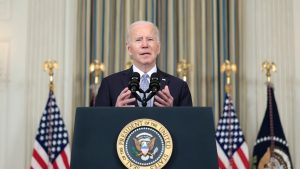Ask seven public policy think tanks how to get the federal budget on a “strong, more sustainable fiscal path” and you’ll inevitably get seven different answers. But when the Peter G. Peterson Foundation queried policy shops across much of the political spectrum, nearly all agreed on one big thing: They can’t do it without new tax revenues. Then, they broadly disagreed on how to raise the money.
The Peterson Foundation did not require balanced budgets, although three groups got there by 2054. Each of the think tanks reduced annual deficits over the next 30 years and all lowered the projected national debt as a share of gross domestic product. All the groups included significant tax changes in their plans and, as in past years, the Peterson Foundation asked the Tax Policy Center to produce a revenue score for each.
Different Roads
But the think tanks achieved deficit reduction in dramatically different ways. Not surprisingly, the groups generally considered farther to the right — the American Action Forum (AAF), American Enterprise Institute (AEI), and the Manhattan Institute (MI) — focused primarily on spending reductions. The groups generally considered farther to the left — the Center for American Progress (CAP) and Economic Policy Institute (EPI) — relied more heavily on tax increases, as did the more centrist Progressive Policy Institute (PPI) and Bipartisan Policy Center (BPC), though to very different degrees.
The Congressional Budget Office projects revenues of 17.9% of GDP in 2034 and 18.8% of GDP in 2054. But that assumes many provisions of the 2017 Tax Cuts and Jobs Act will expire as scheduled at the end of 2025. In the more likely event that much of the TCJA is extended, revenues would be substantially lower, making balanced budgets even tougher to achieve.
Raising Taxes
AEI matched CBO’s baseline revenues. All the other groups increased tax revenues above that benchmark.
Some, such as AAF, BPC, and MI raised revenues to between 18.4% and 19% of GDP in 2034 and between 19.7% and 20.7% by 2054.
Groups such as CAP (20.8%) and PPI (21.6%) would raise taxes substantially more in 2034 and even more in 2054, 21.8% of GDP for CAP and 23% for PPI.
EPI would raise taxes the most, by far. It would boost revenues to 31.3% of GDP in 2034 and to 33.8% in 2054.
While the top-line estimates are fascinating, the way each group would get there is even more interesting, and sometimes makes for surprising bedfellows.
Individual Income Taxes
AEI would lower the top individual income tax rate to 35%, while BPC would raise it to 40%. AAF and MI would restore the pre-TCJA top rate of 39.6% but EPI would raise the top rate to 49% while PPI would raise it to 50%. AAF, AEI, and EPI would eliminate all or most individual tax expenditures.
AAF and PPI would repeal the home mortgage interest deduction. BPC would convert it into a credit. CAP and AAF would create new subsidies for first-time home buyers. Most of the groups would modify the child tax credit, but in very different ways.
Corporate Taxes
AEI would lower the corporate income tax rate to 20% while CAP, EPI and PPI would raise the corporate rate. AEI, CAP, and EPI would eliminate some or most targeted corporate tax breaks.
AAF and PPI would repeal the Affordable Care Act’s Medicare hospital insurance surtax. PPI would phase out the hospital insurance tax entirely. BPC, CAP and MI would raise the hospital insurance tax.
For Social Security, AAF and BPC would raise the cap on taxable earnings and CAP would eliminate it entirely. BPC would raise the payroll tax rate, while PPI would repeal the tax and MI would only tax workers younger than age 62.
Taxes At Death
The groups were closer to consensus when it came to the current law provision that allows heirs to avoid tax on any increases in asset value during a decedent’s lifetime. AEI, BPC, CAP, MI and PPI all would repeal this step-up in basis at death, though AEI would exclude the first $2 million in gains.
AAF and AEI would repeal the estate and gift tax entirely while EPI would increase it. PPI would replace the estate tax with an inheritance tax.
The Peterson Foundation exercise tells two big stories.
First, even with significant spending cuts, nearly all the participating groups, except AEI, recognize that additional revenues must be part of any effort to reduce the deficit. It is difficult, if not impossible, to get there with spending reductions only.
Second, while most of the groups agree on the need for tax increases, they profoundly disagree on how to change the revenue code. It isn’t as if we needed the reminder, but their conflicts foreshadow a challenging fiscal debate in Congress in the coming years.
Read the full article here









